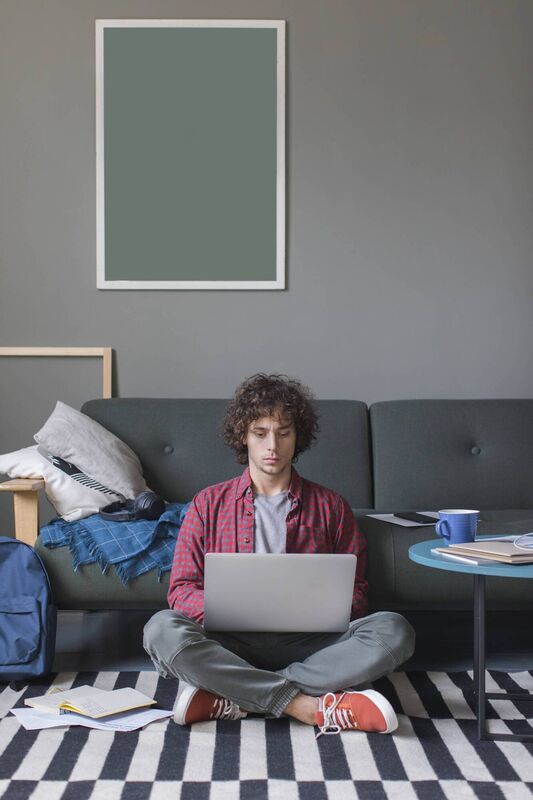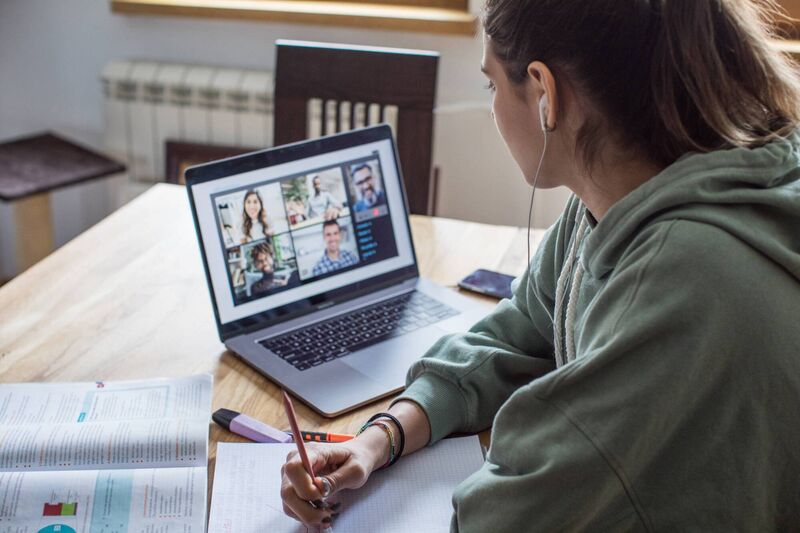Third degree: College students struggling to cope with remote learning experience

Covid-19 has undoubtedly turned third-level students’ lives upside down.
- 70% of students surveyed said they were anxious.
- Lack of motivation was a ‘very serious’ or ‘significant’ problem’ for 75% of students.
- 25% reported ‘always’ having access to reliable broadband.
- Spending less money’ topped the list when students talked about advantages to remote learning.
COVID-19 has turned the typical third-level student experience on its head.
Remote learning is the prevailing reality for the majority, cutting students off from the rich vibrancy of campus life. Opportunities to connect in-person with their peers – so vital for this stage of their development – and with their lecturers - key mentors for their future careers - are rare or non-existent.
In a survey conducted by Ireland’s youth information website SpunOut.ie and the Irish Examiner, students were asked about the impact on their mental health of the changed third-level landscape. The online survey is a snapshot of comments from almost 1,400 students, and it gives an insight into their thinking as they negotiate study under Covid-19 restrictions.
Almost 42% of respondents said they lived in an urban area, 32% were rural-based and 25% said it was an urban/rural mix. More than half of respondents were women (58%) and the majority of those who responded were in first year (almost 34%), with 23% in second year, 19% in third year and 14% in fourth year.

With almost 55% of students saying they ‘never’ attend in-person lectures/workshops in college and 87% reporting they have ‘many’ online classes, it’s no wonder almost three in four feel cut off from friends.
Clare Austick, vice-president for welfare at Union of Students in Ireland (USI), interacts frequently with local students’ union offices and says the primary issues raised by students are around lack of human interaction and connection. “They feel isolated. They don’t have a sense of belonging.”
It’s no surprise it’s taking a toll on their mental health. When offered a range of words to describe their mental health (students could choose more than one description), 70% of survey respondents said they were ‘anxious’, 60% said they felt ‘uncertain’ and 34% described themselves as ‘sad’, while 28% were ‘pessimistic’ and about one-quarter ‘fearful’.
Treasa Fox, head of Athlone Institute of Technology student counselling service and spokesperson for Psychological Counsellors in Higher Education Ireland (PCHEI), says anxiety was the biggest presentation in the counselling office pre-Covid. However, the pandemic has exacerbated this, and she sees a particular impact on first years, some of whom have never met their classmates except online.
“Being around peers has a kind of moderating effect – being able to chat about struggles and challenges in different subjects, and reassure yourself others are feeling the same," she says. "Without the opportunity to have these conversations, to realise your peers are feeling like you – not having that moderating factor is driving up anxiety levels.”
If your device cannot display the data please click here
CBT therapist Paul McCarthy works in student counselling in CIT/MTU. He says there are “early indications” that going on Zoom and having a camera on you is particularly challenging for students with pre-existing anxiety issues. He gives the example of a lecturer dividing a class of 30 on Zoom into five sub-groups, randomly assigning groups of six into smaller breakout rooms.
“There’s a really strong rationale behind it as good for learning and creating discussion. The six students are meant to interact. But if they’re first years they’ve never actually physically met. And some are finding it very hard – they dislike the spotlight being on them, either on camera or having to talk about things with strangers.”
One in three first and second years say they’re ‘sad’, which is “quite challenging to read”, says SpunOut.ie CEO Ian Power.
While first years were more likely to describe themselves as ‘uncertain’, so were fourth years. “Fourth years are about to graduate into a very uncertain world. For some, jobs they’ve been in training for may be in jeopardy,” comments Power.

Almost 70% of respondents have been living in the family home this semester. Nine percent are in student accommodation, 10% said they’re both in the family home and in student accommodation, while almost one in 10 is in a rented home. And when asked about disadvantages of remote learning (they could choose multiple answers), almost 63% cited ‘too much time spent at home’, while 87% said ‘hard to connect with classmates’.
Fox isn’t surprised.
Living at home, she says, their autonomy, independence and decision-making is being compromised. “People revert to roles. Mammy’s possibly doing all the cooking and washing and asking, when they’re going out the door, ‘when are you going to be back?’” says Fox, who also points out the harsh reality that for some students home isn’t a safe or happy place to be.

Asked if remote learning had negatively affected their mental health, marginally more first years (37%) than other year groups rated the impact at 6 or 7, where 0 is ‘no impact’ and 10 is ‘extreme negative impact’.
USI's Austick says ‘Zoom burnout’ is being highlighted as a problem for many students. “Everything’s online – classes, activities, events. All these different groups are competing for students’ attention on the same online platforms.”
She paints a picture of what it’s like for many students: online lecture in the morning, online tutorial straight after, followed by some society/club interaction also offered online. “They could be sitting in front of their screen six or seven hours a day, which is quite overwhelming.”

While 15% of survey respondents said ‘lecturers being more available’ was an advantage of remote learning, 59% cited ‘harder to ask questions’ as a disadvantage.
Austick says in normal circumstances if a student is falling behind or needs clarity on a topic, there’s an opportunity to talk to lecturers after class. “That’s not possible now. A lot of lectures are pre-recorded and many end on time, so there’s no opportunity to discuss issues in those five minutes after. It’s an additional challenge.”
This is particularly the case for first years, she says. “It puts the onus on them to reach out to a lecturer they’ve never met and try to organise a time and way to explain whatever challenge they’re having. What used to be something easily solved is now another challenge.”

This was a ‘very serious’ or ‘significant’ problem’ for 75% of students. Only about four per cent said lack of motivation wasn’t a problem. “We’re social creatures,” says Fox. “Part of what mobilises us is other people, being around them. Without that sort of energy, anyone might find their energy levels and willingness to engage dropping.”
Austick says many students are working and sleeping in the same place – their bedroom. And with assignments often being done at weekends, the days become very repetitive. “For lots of students, their academic workspace is the same as their personal wind-down space. USI is actively promoting a ‘break the bed to desk cycle’.”
Power is particularly struck by the fact that overall 84% of students are finding it harder to engage with course work. “It really speaks to the fact that in-person education where possible is what matters, is what works.”

Just 25% of students reported ‘always’ having access to reliable broadband. Fifty per cent said they have ‘most of the time’. But one in four reported ‘sometimes’, ‘rarely’ or ‘never’ having it.
The survey also highlighted an urban-rural divide. Some 33% of urban students said they "always" had access to reliable broadband compared to 15% of rural students.
At SpunOut.ie, Power hears regularly stories of students having to travel long distances to get access to broadband for exams/assignments.
Austick agrees WiFi access can be quite unreliable, particularly in rural areas but also in urban. “It’s very hit and miss – some days it’s great, other days not. That might be manageable for pre-recorded lectures – but not when it comes to timed assignments and scheduled tests. So students have that panic in the moment, of having something ready to submit and not being able to because of the WiFi connection. And then there’s the anxiety of having to ask for an extension.”

‘Spending less money’ topped the list when students talked about advantages to remote learning. However, about 40% reported losing their full- or part-time work since the pandemic started. One in five is receiving the Pandemic Unemployment Payment (PUP).
Amanda Fitzgerald is associate professor at UCD School of Psychology and co-investigator on the My World Survey 2 (MWS-2) – National Survey of Youth Mental Health. She says the MWS-2 showed financial stress as a top concern for young people, whether their current financial situation, their future concerns about finance and the pressure to work outside of college.
Fitzgerald’s particularly struck by the SpunOut.ie - Irish Examiner survey finding that 34% of students lost part-time work since the pandemic began. “We know young people comprise a large proportion of the casual workforce and many students work in retail and hospitality and have lost their income. And higher levels of financial stress are related to increased symptoms of anxiety and depression in young people.”
At USI, Austick gets a phone call every week from families who are finding it hard to get their deposit and prepaid rent back – their third-level son/daughter’s course moved online so they didn’t need student accommodation after all. “There are also students paying for accommodation they don’t need right now but they’re holding onto it in case things go back to normal next semester.”

Asked if they’d accessed mental health supports or online counselling this year, 16% reported doing so either ‘regularly’, ‘occasionally’ or ‘once or twice’. But almost 24% said they couldn’t access such support – obstacles included not being able to find an appropriate service, not being able to afford it and not having a reliable enough computer or internet connection.
Fox confirms third-level counselling services are all open. “They’re providing services primarily by phone or video. A lot of services are providing half-hour consults – free phone-ins with the counsellor.”
But with students cut off from campus and confined to their home base, she identifies another obstacle to seeking support: lack of privacy. “When we were in level 5 earlier in the year, a student could go for a walk down the road with their phone and talk to the counsellor privately and confidentially. Coming into winter, that’s less of an option.”

Dr Michele Hill, consultant psychiatrist and university lead for student mental health and wellbeing at UCC, says student/youth mental health was already in crisis pre-pandemic. “Covid has added to the pressures of this age group, and social restrictions and online learning have a big impact on the ability of a young person to feel connected in the world.”
The Covid ‘new normal’ is adding stress to all young people, but with the years between 15-25 the highest risk age for developing a lifelong mental health condition (e.g. anxiety disorder/psychotic illness/eating disorder).
“What about students who are developing a mental health condition at the moment or who are coping with a pre-existing one," asks Dr Hill. "This could be the final tipping point for a person on the brink of developing such a condition, or cause a person with a mental health condition to get worse or relapse.”
Dr Hill says it’s crucial supports are provided for the full range of mental health issues that occur in this age group – from mild self-limiting issues right up to severe enduring mental illness. “It’s a mistake to approach it is an issue that can solely be solved by wellbeing campaigns, online supports, and counselling services in the community. There hasn’t been nearly enough roll-out of evidence-based programmes within the HSE that could support young people with higher-level needs faster, such as DBT – an excellent therapy for people with significant emotional regulation difficulties, which is a significant proportion of the students I see in my clinic. Early access to the right care has a huge impact on a young person’s life.”

Covid-19 has undoubtedly turned third-level students’ lives upside down. Despite this, 22% described themselves as 'optimistic', 23% as 'accepting', while 13% were 'happy' and six percent 'excited'. And counsellors across Ireland’s third-level sector describe students’ resilience, how they’re rising to the challenge.
The AIT counselling team’s description is reflective of the general feedback: “Students are really doing the best they can to get on with things, having to dig deep to find resources within themselves to get through – because there’s so little external to themselves that they can engage with.
“But they’re doing it – really looking out for each other, finding creative ways to connect. They’ve mobilised to do food drops to students who are isolating and incoming international students who had to quarantine – students they’ve never met. They’re just being incredible.”
- The SpunOut.ie — Irish Examiner survey is a convenience sample of 17 to 25 year olds living in Ireland. The respondents were recruited through advertisements on Facebook and Instagram







